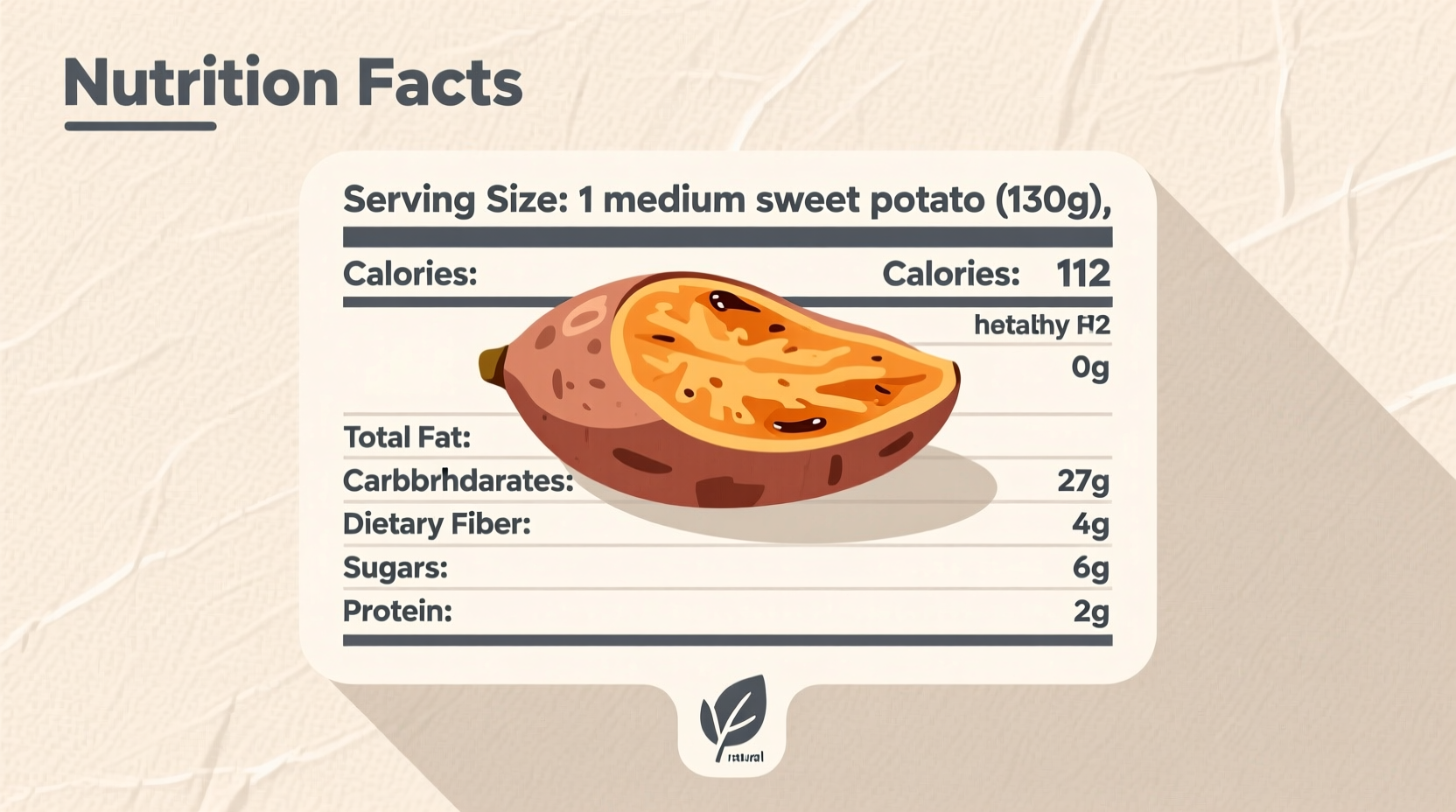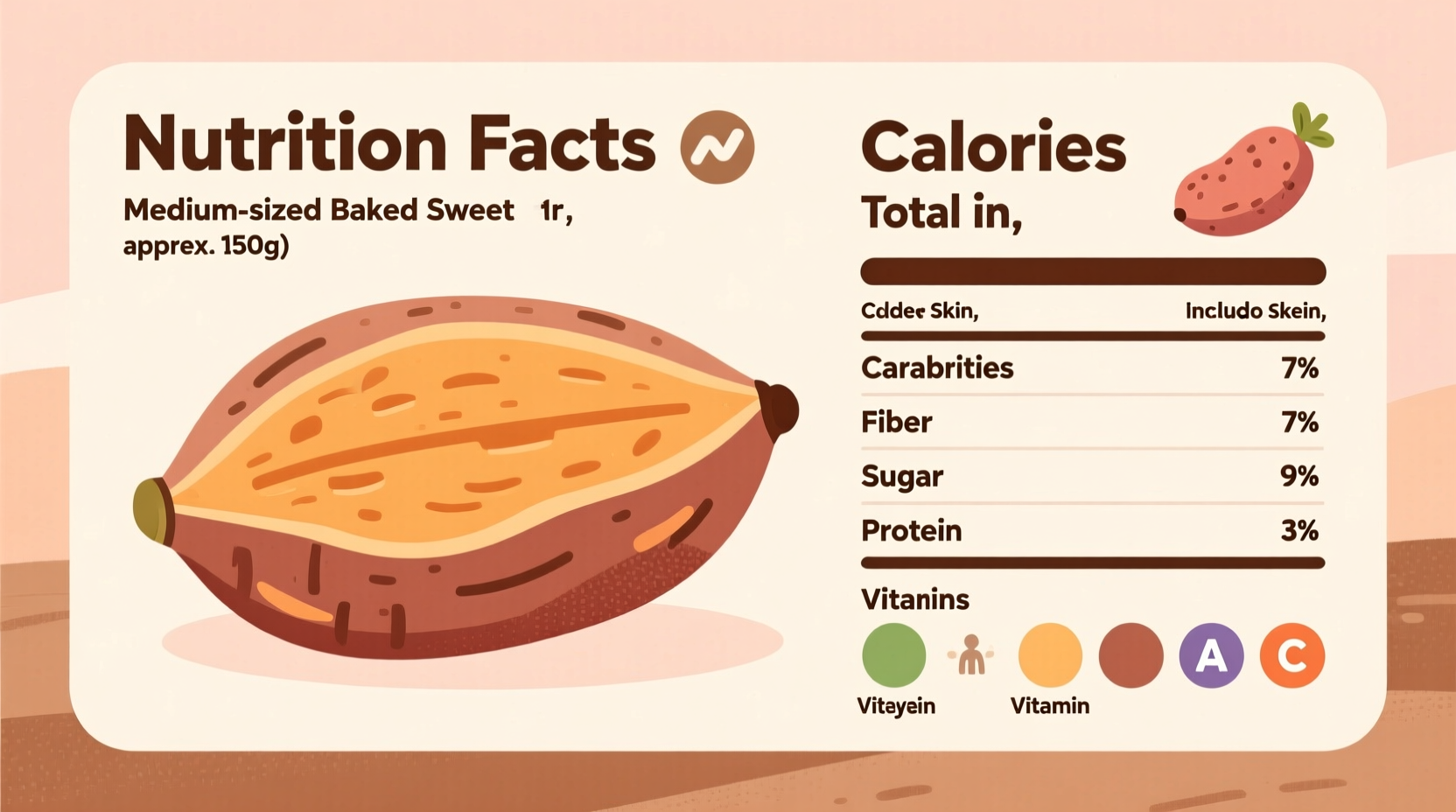Understanding the exact calorie content of sweet potatoes is essential for anyone tracking their nutritional intake. Whether you're managing weight, following a specific diet plan, or simply making informed food choices, knowing precisely how many calories are in sweet potato servings helps you maintain dietary control without sacrificing nutrition.
Exact Calorie Counts: Size and Preparation Matter
The calorie count in sweet potatoes varies based on size and cooking method. While the standard medium sweet potato (130g) contains 112 calories when boiled, different preparations yield different results. This variation explains why many people get confused about sweet potato calories—they're not accounting for preparation differences.
| Preparation Method | 100g Serving | Medium Sweet Potato (130g) |
|---|---|---|
| Raw | 86 calories | 112 calories |
| Boiled, without skin | 76 calories | 99 calories |
| Baked, without skin | 90 calories | 117 calories |
| Fried (as fries) | 305 calories | 397 calories |
| Mashed with milk and butter | 118 calories | 153 calories |
This comparison clearly shows how preparation dramatically affects calorie content. Baking concentrates natural sugars slightly more than boiling, while frying or adding dairy significantly increases calories. For those tracking intake precisely, preparation method is as important as portion size.
Nutritional Benefits Beyond Calories
Sweet potatoes deliver exceptional nutritional value per calorie. One medium sweet potato provides:
- Over 400% of your daily vitamin A needs (as beta-carotene)
- 35% of daily vitamin C requirements
- 27% of daily manganese needs
- 5 grams of dietary fiber (20% of daily value)
- Only 0.1 grams of fat
Unlike regular white potatoes, sweet potatoes have a lower glycemic index (around 44-61 depending on preparation), making them a better option for blood sugar management. The fiber content further supports digestive health and helps maintain satiety, which can prevent overeating later in the day.

Practical Portion Guidance for Different Goals
Understanding how sweet potatoes fit into various dietary approaches helps you make informed choices:
For Weight Management
A medium boiled sweet potato (99 calories) makes an excellent carbohydrate source in calorie-controlled diets. Pair it with lean protein and non-starchy vegetables for a balanced 300-400 calorie meal that keeps you full for hours.
For Active Individuals
Athletes and active people can benefit from the complex carbohydrates in sweet potatoes. A large baked sweet potato (180g, approximately 162 calories) provides sustained energy before workouts without causing blood sugar spikes.
Common Tracking Mistakes to Avoid
Many people unknowingly miscalculate sweet potato calories by:
- Not weighing cooked versus raw (cooked sweet potatoes weigh less due to water loss)
- Forgetting that added toppings significantly increase calories
- Confusing sweet potatoes with yams (which have similar nutrition but different varieties)
How Sweet Potatoes Compare to Other Common Carbohydrates
When evaluating "how many calories in sweet potato" compared to alternatives, consider these nutritional trade-offs:
- Sweet potato vs white potato: Similar calorie counts, but sweet potatoes offer dramatically more vitamin A and fiber while having a lower glycemic index.
- Sweet potato vs rice: One cup of cooked white rice (205 calories) has more than double the carbohydrates of a medium sweet potato with fewer vitamins and fiber.
- Sweet potato vs quinoa: Quinoa has more protein but also more calories per serving (222 calories per cup cooked).
These comparisons show why sweet potatoes are often recommended as a superior carbohydrate source—they deliver more nutritional bang for your calorie buck.
Maximizing Sweet Potato Benefits While Managing Calories
You can enjoy sweet potatoes while maintaining calorie control with these practical strategies:
- Choose boiling over baking for slightly fewer calories and better retention of water-soluble nutrients
- Keep the skin on when possible for added fiber (just scrub thoroughly)
- Avoid sugary toppings—skip marshmallows and brown sugar for healthier options like cinnamon or a small pat of butter
- Measure portions before cooking since size varies significantly between sweet potatoes
Registered dietitians consistently recommend sweet potatoes as part of balanced diets because they satisfy carbohydrate cravings while delivering exceptional nutrition. The Academy of Nutrition and Dietetics notes that orange-fleshed sweet potatoes are among the top vegetable sources of beta-carotene, which the body converts to vitamin A—a nutrient many Americans don't get enough of.











 浙公网安备
33010002000092号
浙公网安备
33010002000092号 浙B2-20120091-4
浙B2-20120091-4